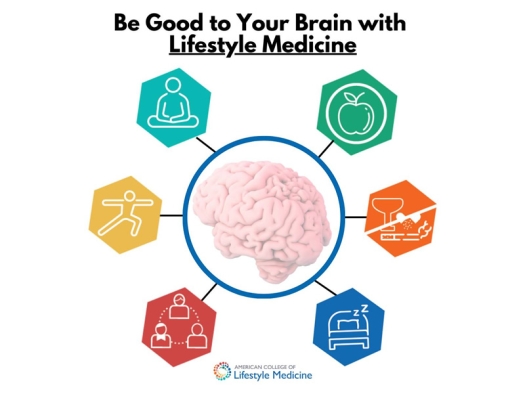LifestyleMedicineBeGoodToYourBrain.jpg

Image by American College of Lifestyle Medicine
Insights from the Lifestyle Medicine Conference
Lifestyle medicine is defined as ‘a medical specialty that uses therapeutic lifestyle intervention as a primary modality to treat chronic conditions’ (American College of Lifestyle Medicine). It encompasses six pillars to maintain for good health: nutrition, physical activity, stress management, restorative sleep, social connection, and avoidance of risky substances.
The Lifestyle Medicine Conference, which primarily included health coaches using lifestyle medicine, opened up discussion and provided an excellent reminder of the profound impact that simple actions and modalities can have on our health.
What kinds of simple actions?
First of all, any small steps to improve the six pillars are beneficial. For nutrition, it might be one action at a time, such as skipping dessert, replacing sugary drinks with bubbly water or adding more fresh fruits and vegetables to your daily consumption. For physical activity, it might be parking your car further away from where you’re going to get some extra movement, or taking the stairs instead of the escalator. Stress management may involve incorporating a few minutes of deep breathing and awareness into your day. For restorative sleep it might be keeping your cellphone and other electronics out of your bedroom when you go to sleep. Social connection may entail the decision to reach out to one friend per week for a coffee/tea (or a walk and you can tick the physical activity box too!), and avoidance of risky substance may be drinking one less cup of coffee each day. While these actions on their own will not immediately enable a leap to optimal health, they slowly but steadily change the trajectory of regular habits to support overall health and wellbeing.
Second, starting early with any effort to improve one or more of the six pillars should ideally not be underestimated. Currently, it often happens that many of us start thinking about wellbeing only when we start experiencing health challenges, and even then, tend to seek out natural or complementary approaches like lifestyle medicine only after having exhausted all other conventional medical options. But taking a proactive approach to understand the impact of the mind, emotions and actions on health can dramatically improve quality of life and prevent many chronic illnesses from occurring in the first place.
Third, becoming more aware that all our thoughts, emotions and actions have an influence on our health is how we can be both proactive and manage health challenges when they arise. For instance, noticing our inner and outer dialogue can help us become aware of whether our general attitude is oriented towards fear or gratitude. Regularly engaging in exercises to facilitate gratitude are easy to do and can significantly improve our wellbeing. It can be as simple as writing down a list of five to 10 things about your day that you feel grateful for before going to bed.
An equally powerful concept and action is forgiveness and letting go, which frees us from negative emotions that can be detrimental to our health, for example, continuing to feel the psychological pain of a perceived offense, bringing negativity into our present relationships, becoming vulnerable, resentful and bitter.
We all have experiences in life that call for forgiveness. There are several exercises that can be done to facilitate forgiveness, such as the following:
The Forgiveness Scale 0-100% (Robert Holden & Louise Hay).
- Choose a person you would like to focus on
- Breath and relax into your body
- How much have you forgiven this person from 0 to 100%?
- How does being the percent you chose affect how you live your life?
- How does it affect your happiness, health and success?
- How does being the percent you chose affect your relationship with others?
- How does the percent you chose affect your relationship to money, abundance, food, creativity, spirituality?
- In your mind, increase the number by a certain percent (as much as you feel is feasible, even if it is only 1%)
- Once you reach at least 80%, affirm “I am willing to forgive (insert name) 80%
Say this a few times and monitor your physical, emotional and mental reactions. Stay here until it feels comfortable. Then keep going farther along the scale until you reach at least 95%.
Additional techniques
It is true that it’s easy to say we need to make changes, focus on the six lifestyle medicine pillars and our lives will change for the better. But it is also true that in practice changes, even small ones, are not easy. Our self-beliefs, internal dialogues and external influences all affect us and our behaviors in myriad ways, many of which we are not even full conscious of, if at all.
Fortunately, there are a number of techniques that can help us bring these influences and their impact on us to the surface of our own awareness, and if needed, change them.
HeartMath and Heart tapping are two such techniques.
HeartMath uses a variety of specific short techniques to do things such as shift us from strong negative emotions into a neutral emotional state, prepare us for challenging situations, reset during/after stress, or build resilience. An example of one of the techniques to use whenever you are highly stressed includes the following:
- Focus your attention on the area around your heart
- Take a deep but comfortable breath in for five seconds and then breath out for five seconds. Keep doing this for at least 30 seconds. Feel as if the breath is coming into and out of the heart area. Don’t hold your breath at all. If you find five seconds for each inhale/exhale uncomfortable, try three or four seconds instead
More about these techniques can be found on the HeartMath website.
Heart tapping (also known as Emotional Freedom Technique (EFT)) is a longer process, which involves first selecting an issue that you want to work with/alleviate (e.g. Feeling overstressed and overwhelmed), and identifying the intensity of the issue for you on a scale of 0 (low) - 10 (high).
A practitioner will then take you through tapping the main meridian points in the body to help access the body’s energy around the issue and send signals to decrease cortisol and restore balance. Along with the tapping, they will put words to the issue to acknowledge it and suggest what you may need to emotionally shift to let go of it. Further detail on the process and each step can be found on the Healthline website.
Heart tapping is an excellent example of a ‘simple’ action, but with a profound impact. While working physically with the meridian points, you are simultaneously making space to feel and become more aware of the issue of focus, and working to change it by introducing a different consciousness and dialogue around it. In our information age, where we tend to live primarily at the level of the intellect and forget the body and heart wisdom, heart tapping can be an exceptionally impactful practice to ground and increase wellbeing. The experience of it, even as a practitioner myself, left an impression. It brought me back to my body, increased my present moment awareness, and decreased the issue I was focusing on significantly.
This is not to say that techniques like HeartMath and heart tapping are the solution to all health problems, but they address a crucial part of the puzzle that is often missed. From here, the approach of integrative medicine (using all available effective resources to attain health) is probably the most comprehensive way to continue the journey to health, and there are important initiatives working towards this.
For instance, some general practitioners are working to develop ‘value-based health care’ by introducing lifestyle medicine into their practices. They continue their conventional approach, but integrate the principles of lifestyle medicine and work with a wellness director to support individuals in improving their health according to the six pillars. An example of this was described by Dr. Mohammad Yamani, who outlined the efforts in his clinic in the US. More information can be found on Dr. Yamani's HealthiWealthi™ Podcast on the Lifestyle Medicine website.
There are numerous approaches to lifestyle medicine, all of which have a common thread: it starts with us understanding ourselves, coming from a healthy emotional state, maintaining balance in our six pillars, and using all effective resources available.
The two links below provide additional information and resources on lifestyle medicine:
- The Lifestyle Medicine website
- The Lifestyle Medicine University website


